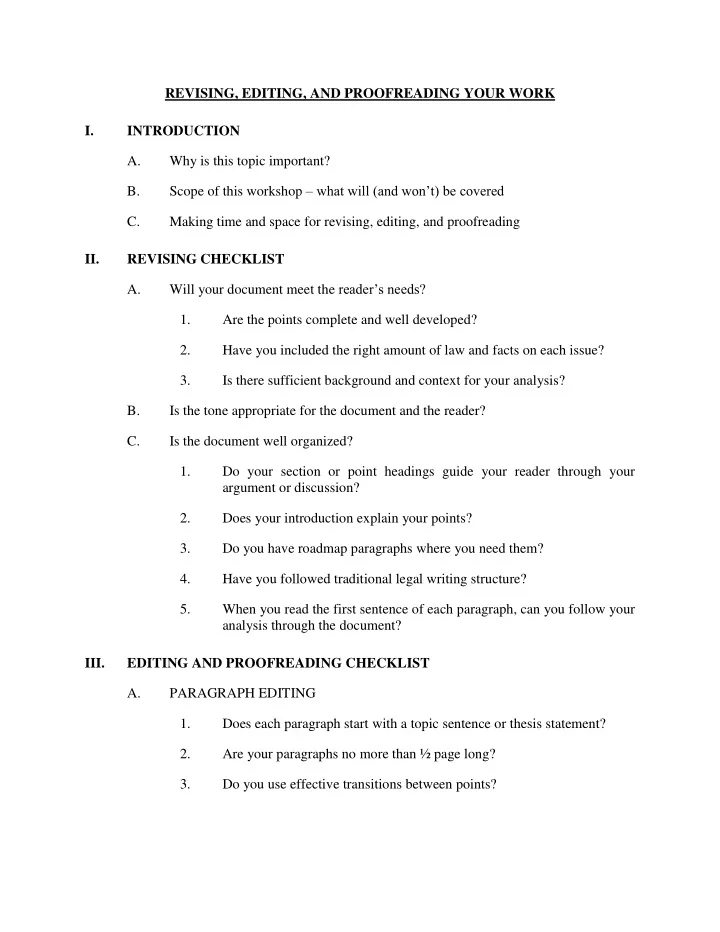

REVISING, EDITING, AND PROOFREADING YOUR WORK I. INTRODUCTION A. Why is this topic important? Scope of this workshop – what will (and won’t) be covered B. C. Making time and space for revising, editing, and proofreading II. REVISING CHECKLIST Will your document meet the reader’s needs? A. 1. Are the points complete and well developed? 2. Have you included the right amount of law and facts on each issue? 3. Is there sufficient background and context for your analysis? B. Is the tone appropriate for the document and the reader? C. Is the document well organized? 1. Do your section or point headings guide your reader through your argument or discussion? 2. Does your introduction explain your points? 3. Do you have roadmap paragraphs where you need them? 4. Have you followed traditional legal writing structure? 5. When you read the first sentence of each paragraph, can you follow your analysis through the document? III. EDITING AND PROOFREADING CHECKLIST A. PARAGRAPH EDITING 1. Does each paragraph start with a topic sentence or thesis statement? 2. Are your paragraphs no more than ½ page long? 3. Do you use effective transitions between points?
B. SENTENCE EDITING 1. Are most of your sentences simple and fewer than 25 words? 2. Have you eliminated any unnecessary legal jargon? 3. Are your subjects short and mostly close to their verbs? 4. Are most of your verbs active? 5. Have you avoided vague or wordy constructions? 6. Have you avoided SAT words? 7. Have you minimized the use of block quotes and integrated other quotes into your writing? Have you used pronouns only where they’re clear? 8. 9. Have you looked up any grammar questions? C. PROOFREADING QUESTIONS 1. Have you experimented with a range of proofreading strategies to find the best ones for you? 2. Have you printed out and read your document at least once? 3. Have you proofread separately the most important or complicated parts of your document? 4. Have you specifically looked for your most common typographical errors? 5. Have you double-checked dates, numbers, and names? 6. Have you proofread your citations separately? IV. WHAT YOU LEARN FROM THIS PROCESS Be mindful of and identify your own strengths and weaknesses – this will help on A. your next project. B. Create a personal revision checklist. C. Locate resources to help you write and revise your work. 2
WRITING RESOURCES 1. Legal Writing in Plain English, Bryan Garner Point Made: How to Write Like the Nation’s Top Advocates , Ross Guberman 2. Woe is I: The Grammarphobe’s Guide to Better English in Plain English , Patricia 3. O’Conner 4. Making Your Case: The Art of Persuading Judges, Scalia and Garner 5. Eats, Shoots & Leaves: The Zero Tolerance Approach to Punctuation, Lynne Truss 6. Plain English for Lawyers, Richard Wydick 3
Recommend
More recommend